 If there’s been a theme running through many of our most recent blog posts, it’s been making your brand stand out – not just against other radio stations in town, but the myriad competitors radio broadcasters are now facing.
If there’s been a theme running through many of our most recent blog posts, it’s been making your brand stand out – not just against other radio stations in town, but the myriad competitors radio broadcasters are now facing.
Spotify and Pandora, SiriusXM, Alexa and Google Voice, Joe Rogan and Michelle Obama, TikTok and Clubhouse.
Everywhere you look, radio is often being outgunned by technology – brands that are more innovative and future-focused, not to mention their thousands of employees and billions of dollars.
I’ve heard programmers, managers, and even owners lament about how radio can possibly compete against the likes of Amazon, Tesla, Apple, and other corporate behemoths that have built immense, multi-layered platforms. And oh by the way, these companies have the inside track on attracting – and compensating – the best and the brightest employees to their workforce.
Depressed yet?
Because that IS the mission – finding ways to stand out, connect, and engage your current audience, while attracting new users to the fold, even in an environment we couldn’t possibly imagine just a couple of decades ago.
In the past, I’ve written about the concept of “high tech” and “high touch” – an idea popularized by Megatrends author John Naisbitt four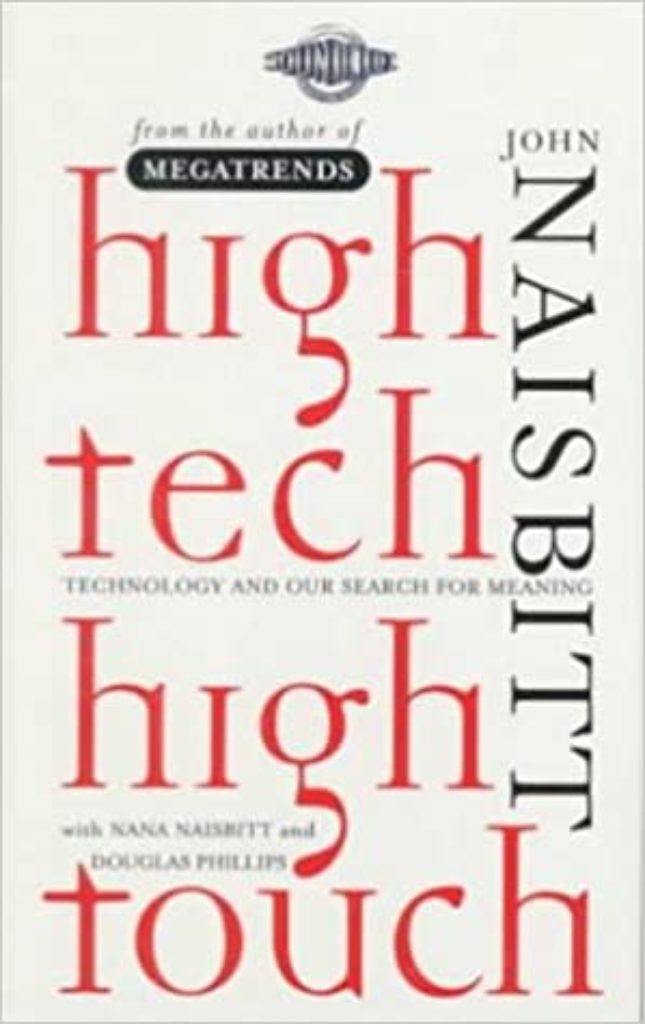 decades ago. He realized that while technology would rock our world with amazing innovation and advancements, it can also be cold, detached, and impersonal.
decades ago. He realized that while technology would rock our world with amazing innovation and advancements, it can also be cold, detached, and impersonal.
Thinking about the ways in which brands interface with us, there are the hundreds of social media posts we scroll past every day. They’re fine, of course, but they are also just a different form of “mass communication – a single tweet or post is designed to reach thousands or even millions of consumers. It’s not easy to personalize them.
But your midday talent can post something interesting, funny, and hopefully, relevant. She can personally respond to everyone who engages with her. It takes more time to write a comment than it does to slap up an emoji or a GIF, but as we continually see in focus and L.A.B. groups, listeners are always impressed by any acknowledgement by the station, or even better yet, a personality.
It’s similar with email. These are typically one-way communications between the station and thousands of folks who opted in to a database. Outside of the obviously machine-created “Dear Frederick” or “Hi, Jacobs” greetings (I get both of these a LOT), these communiques, by design, are awfully generic.
And they certainly don’t leave a positive impression when they get your name wrong, or it is awkwardly used. If anything those hiccups signify the sender doesn’t get it.
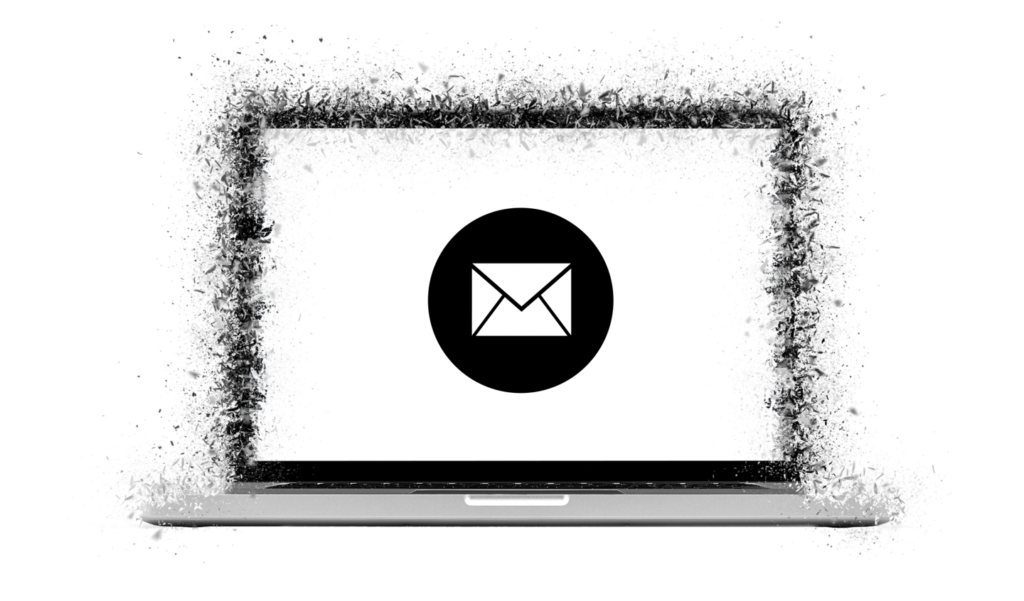 And after all, while we love the efficiency – time and financially – of the “email blast,” it has become exponentially more difficult for brands to get noticed with these mass messages. That’s because most of us receive a high volume of emails every day, seven days a week. Some of us get well more than 100 emails a day.
And after all, while we love the efficiency – time and financially – of the “email blast,” it has become exponentially more difficult for brands to get noticed with these mass messages. That’s because most of us receive a high volume of emails every day, seven days a week. Some of us get well more than 100 emails a day.
When you skim them to filter out which are truly important, you sometimes end up missing your fair share of the marketing efforts brands are deploying to get you to open the email, read it, and maybe even respond.
On social media, they make it SO simple for you, you don’t even have to come up with a simple one or two word response to a promotion, birthday, anniversary, or happy event.
Their AI comes up with generic responses designed to look personal. One click, and you’ve taken care of Ethan. Now onto the birthdays.
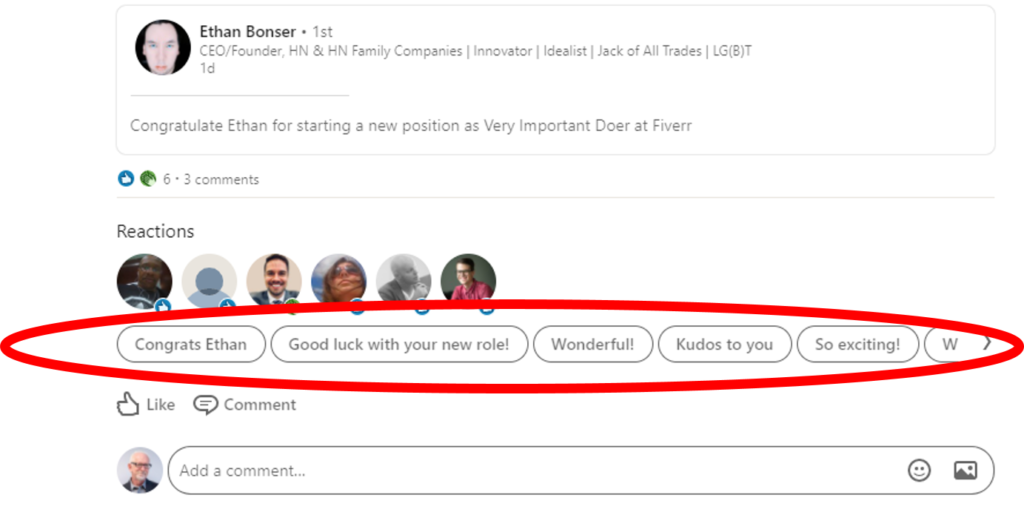
So on my good days, I employ a system where my messaging is read nearly 100% of the time. People notice my communications, and they always stand apart from the pack.
As often as I can, I write personal, handwritten notes.
Now, this is a commitment, and I need to be better and more consistent at it. But sitting down and penning a note, addressing it, and putting it into the mail is almost a sure-fire way to get noticed.
That’s because few people take the time, effort, or care to do it.
It sends a message to recipients that you thought enough of them to call a time-out, and pen a missive of thanks, appreciation, or acknowledgement.
When they do, good things often happen.
I was scrolling through LinkedIn the other day, and ran across a great post from Mike Thomas Voss, market manager of ESPN 1000 in Chicago. Mike is one of the few people out there with a Marconi for both a music station (WZLX) and a sports station (WBZ-FM). He has strong instincts for entertainment value across the entire spectrum.
So, when I ran across this post, recounting an encounter that occurred five years ago, it jumped out at me. For Mike – someone used to being around celebrities – a rare handwritten note left an indelible impression. And it’s a story he continues to tell:

That same week, my daughter, Allie, met up with us in Florida, flying from Detroit on a Delta flight to Ft. Lauderdale. She has no “status” with Delta, and bought a discounted coach seat. In other words, just another passenger on just another domestic flight.
But near the end of the trip, a flight attendant walked through the cabin, handing out personalized, hand-written postcards. What kind of impression did it make? Allie (also in media/marketing) was blown away by this surprising gesture, so much so that she told me about it, and kept the postcard to show me:
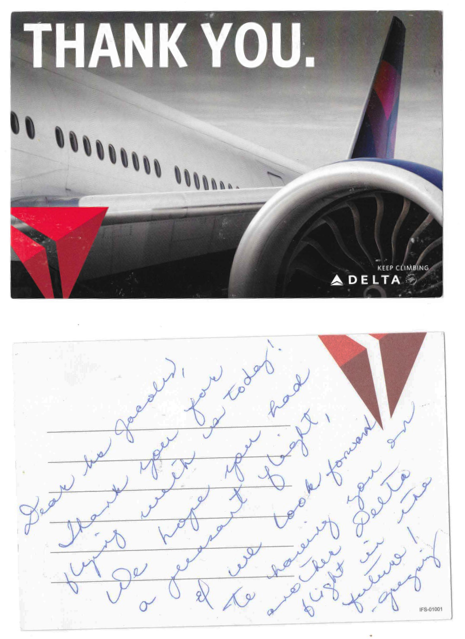
Especially given it was her first flight since the start of the pandemic, it had even more impact. For an industry that has had one of the cruelest years possible due to COVID, a genuine display of thanks and appreciation from one of its grassroots employees generated great word of mouth for the airline.
I am a “diamond” with Delta – the top of the heap – and I continually receive emails from Delta’s CEO, Ed Bastian. They are casually branded “Your Update From Ed,” and they keep me up to date with what Delta is thinking and doing during the pandemic. They are well-crafted ostensibly by a marketing team, warm, and not very corporate. And I read most of them.
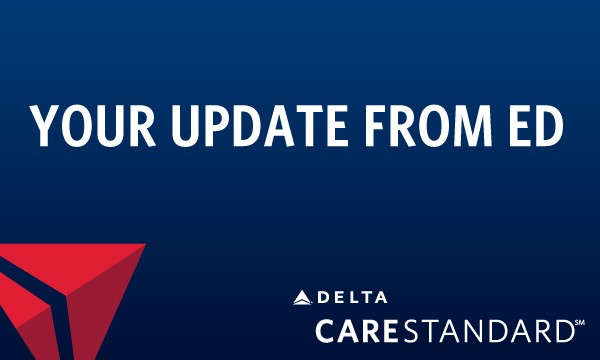
But a handwritten thank-you card from a flight attendant named Gregory is in another league entirely. It stood out, and far more meaningful.
Sure, it’s old school. In fact, it doesn’t get more analog than this. And that’s precisely why it works.
It takes absolutely no effort to click on a “like.” A text message takes seconds to send. With many emails, perhaps a tad longer. Technology makes this message so easy, we often ignore these gestures. They’re mundane, occurring loads of times each and every day, and they require minimal effort to crank out.
But taking the time to compose your thoughts and print or write a personal letter or card is attention-getting. In fact, it’s such a great idea than an entire country is now trying it.
A fascinating story in Sunny Skyz describes a pandemic-inspired campaign launched by Canada Post – yes, the Canadian version of USPS.
Here’s the concept: Every household in the country – all 13.5 million of them – receives a prepaid postcard. The mission? Send a message to someone you care about.
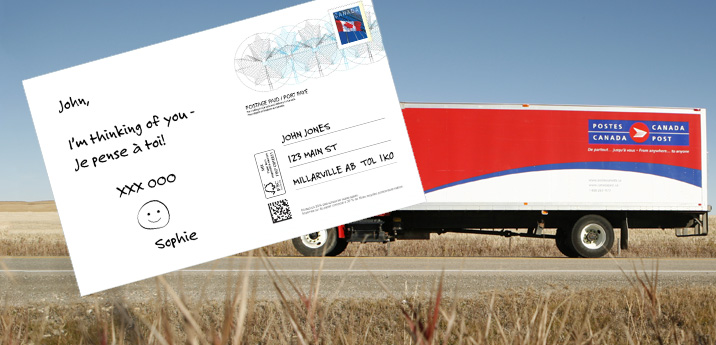
Canada Post is inviting the entire populace to send the postcard to anyone in the country – just to say hello, to check in, to see how someone else is getting by. As the President and CEO of Canada Post, Doug Ettinger, explained:
“Meaningful connection is vital for our emotional health, sense of community and well-being.”
Those are perceptive words from a government executive, who clearly has a strong grasp on what his citizens are thinking and feeling one year into the COVID outbreak. (We could use someone like Ettinger running our post office.)
The radio application? It’s obvious. After a tumultuous year, broadcasters are just beginning to recover financially. The business climate and demand for spot inventory is improving, and stations and their companies are beginning to see a way out of this disaster.
But for many in the listening audience – the folks who have stuck with our stations through thick and thin – their futures might be cloudier and less optimistic. That means its a perfect time to receive a personalized postcard from a member of the airstaff, the market manager, or even the company CEO, thanking them for continuing to listen throughout 2020.
Yes, it takes a lot of time. But Thomas Rhett was willing to do the work. Also true for Gregory, that Delta flight attendant.
 Marketing dollars? They’ll be virtually nonexistent for most radio stations this year. But a few thousand cool station postcards at 36¢ a pop for postage, and your audience could receive personalized little analog Easter eggs from your station and your staff.
Marketing dollars? They’ll be virtually nonexistent for most radio stations this year. But a few thousand cool station postcards at 36¢ a pop for postage, and your audience could receive personalized little analog Easter eggs from your station and your staff.
Who knows where they could end up? Or whether those fans you send them to respond?
Will it make a difference in your spring book, your Q2 sales, your investor calls, or your bottom line?
It’s hard to say because it’s such a small, personal gesture. But this is how you play a long game – it’s how you create brands built to last.
For a couple of Millennials – a singer songwriter and a flight attendant – a few minutes of their time and a little ink created a lasting impression. And experiences passed along to family and friends, via word of mouth and social media.
And now I’m sharing it with all of you. And I bet some of you share it with others.
It’s working.
- What To Do If Your Radio Station Goes Through A Midlife Crisis - April 25, 2025
- A 2020 Lesson?It Could All Be Gone In A Flash - April 24, 2025
- How AI Can Give Radio Personalities More…PERSONALITY - April 23, 2025




Hi Fred
I really loved this blog. The Delta story was very cool, and it reminds me how powerful a hand written note is.
Appreciate it, Gene. You & Julie were always very high-touch with your audiences. There are lots of ways to do it, of course, but the handwritten note is one of the easiest & most effective.
I send every prize we give away in the mail, in a thank you card, handwritten and signed by me to every winner. And yes, it makes a big impression. I can’t tell you how many times someone posts their thank you card online and tags us. It is a great way to break the clutter.
Diane, thanks for sharing your “thank you” success story. I am not surprised.
It’s true. I have fans that still write to me that I wrote back to while I was on air, and I’ve been beached 5 years. But, that impact lasts for a long time, and, like you, passing on the story of a personal note increases your word of mouth advertising and impact. Hey, Delta is now one up on Southwest.
And, you’re right. At the end of the day, who’s going to remember that email. Or, how often do you pay attention to my online rants (to be honest, you wisely ignored most of the in-person ones as well)? Personal connection is not just a way to success. It’s the way of letting people know you’re grateful for their time spent with you.
Great article, Fred!
Thanks for adding to the conversation. These genuine connections are lasting. I hear similar stories in focus groups all the time. Appreciate you sharing yours.
I’ve always believed in the power of handwritten notes. For years I’ve told people (especially those younger than me) to send handwritten notes after interviewing.
It’s always a good idea, and a great way to show you care following an interview. Thanks for that, Pam.
I’m so old, I remember responding to listener letters – you know, with envelopes and stamps! As you note, it’s gotten a lot easier. And well worth the effort. So many times, I was able to bring an angry “I’ll-never-listen-to-your-&^%$#%-station-again” customer back into the fold just by acknowledging their concerns are respected and noted. People seem blown away – “I never expected to hear from a live person.” (That’s an entirely different issue!) I figured if someone’s taking the time to tell you what they think, they must have some some passion for the brand. Probably a good idea to try and maintain it.
Well, Pete, you and I are in the same demographic fraternity. Like you, I responded to every listener letter. (Fortunately, there weren’t a ton of them). And I know I was guilty of getting a little wrapped in explaining that we were playing more than two Jethro Tull songs!
And yes, it was easy to turn pissed off people around. They were station fans – they just wanted someone who would listen to them.
Thanks for the comment.
Hi Fred:
Interesting blog. I agree. In fact, I sent out 2 cards in the snail mail last night- I can send an email that says “feel better” or happy birthday, but a card means I though about you enough to find paper, a pen, a stamp and your address. My friends often commend me on my notes. And honestly, how many times do you print and hang up an email? But I bet you do hang on to an outstanding card on occasion…
You do, indeed, Cousin Jan. Thanks for sharing the story & your experience. They raised you right!
To quote Maya Angelou…
“I’ve learned that people will forget what you said, people will forget what you did, but people will never forget how you made them FEEL.”
’nuff said.
JC, Maya knows best! And I’m sure you could read that throughout the post. Thanks for adding to the convo.
As usual a great blog post! The power of the handwritten note is one of the things I talk about almost every time I speak with aspiring students and community groups. I credit my mother with strongly encouraging me to write notes as a child.
In the 60’s starting in grade school, I wanted to meet jocks that inspired me. My mom had me write letters. Grant Horton, Dick Clayton, Nick Charles, Gene Hirsch, Doug Eason and Buddy O’Shea all responded. That lead to my first on air job at WGNU when I was a junior in high school.
Fast forward 52 years, including the last 43 years doing management in this market. Last fall I gave my CEO six months notice that I was ready to retire once we found my replacement. My replacement turned out to be someone I hired for their first job when they were starting Junior College.
My bosses convinced me to do “semi-retirement”. Continuing my 43 year morning show, working on some programming, sales and community outreach projects as well as remaining on the board of directors. The best thing about semi-retirement, I no longer have to make decisions.
Why share my history? A primary reason I have been blessed with success is my daily commitment to written communication both as a manager and a personality. If you’re a Mike “in the Morning” P-1, P-2, P-3 and we’ve crossed paths somehow, someway, somewhere, you’ve gotten a note from me. If you’re a contest winner, a guest on the show, you’ve gotten a note from me. Listener or not, if you are someone I’ve met and had a conversation with at a community event you’ve gotten a note from me. If you’re one of my 30+ annual advertisers, many of which I have done live reads for 10, 20, 30 or 40 years you hear from me in various written forms over the course of the year. Live read sponsors don’t care a bout ratings, they want the “vibe” created and the direct customer response to their top of the rate card annual commitment to the station.
Now, more than at any other point in my career does a written note, letter or card stand out and screams, Mike cares! It is so simple to make a lasting impact to strengthen your personal brand.
Long winded, so I’ll get off my pro-letter writing soapbox. Thanks!
Not at all, Mike. Thanks for the “master class” in connection. I’m sure a whole slew of talent will read this comment and take it to heart. This is spot-on, whether you’re living in the Age of Aquarius or in the iPhone Era. Thanks for this, and special thanks to your mom who gave you great advice.
It’s not just handwritten notes that make people feel special. It is part of going above and beyond in customer service.
Years ago, I was at a conference at the Ritz Carlton in Naples Florida and realized I forgot a black belt. I went to the store on the bottom floor and the salesperson told me they did not sell belts there but in the store on the next floor up. My memory is a little vague about that encounter but I guess she must have asked me my name or got me to volunteer it.
I don’t think it took me more than 90 seconds to get to the store that sold belts but when I walked in, the salesperson greeted me BY NAME and had three belts IN MY SIZE laid out for me to try on. They had communicated to make sure I was taken care of.
THAT is customer service.
When a client tells me they have “great customer service” I tell them that story and challenge them to give me a story like it otherwise “great customer service” becomes a meaningless cliché like “conveniently located”.
When I would see a listener picking up a prize at the front desk (you know…..the olden days), I would offer them a tour of the station to make a closer connection. They were always thrilled to see the operation.
Little things do make a big difference. Thanks for the reminder.
Mike, thanks or adding to the conversation. This is a great story about service that you’ve probably told 100 times. It’s something radio stations and personalities should aspire to. Appreciate it.
Wow, what a truly fantastic story, Mike! I think all definitions of “customer service” should immediately be replaced by your experience! Awesome. And also awesome that you would give tours to listeners. I did that too, and as you said, the listeners were always just enthralled–and isn’t keeping listeners happy and enthralled so key to all that we do? Thanks for sharing such a great, feel-good story!
Our moms and grandmothers taught us right. I couldn’t fathom how many prizes I’ve given away over my career, but a handwritten “congratulations and thank you for listening”–note was always a must for me. And though I didn’t do it for any other reason than to genuinely congratulate and thank the listener, that extra moment of time has paid off with lifelong friendships with many listeners. Neatness–and niceness–counts.
People remember the thank-you note long after the concert is over or after they’ve cashed in the Chicken McNuggets coupon. Appreciate it, Dave.
My current VP/Market Manager is FAMOUS for his hand-written notes of appreciation. When you walked in the door, and found a note waiting for you on your desk, you knew you had accomplished something great! — And he has not let the pandemic stop him either: in the age of working from home, those handwritten notes still arrive via USPS.
Even more special considering there’s more effort required.
Leading by example…
It sets the tone, Bev. And you obviously don’t forget gestures like that. Thanks for sharing it.